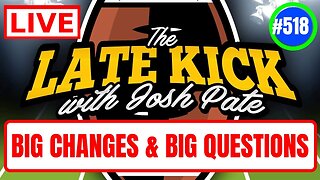How Childhood Emotional Abuse Affects You In Adulthood
People who were emotionally abused as a child continue to feel the effects as an adult. If you have experienced emotional abuse as a child, it is likely that you will relate to some of the following symptoms or behaviors in this video. Often we suppress painful memories so we may not realize that we are acting out when it is caused by our repressed childhood trauma.
#EmotionalAbuse #MentalHealth #Abuse
Music:
https://www.youtube.com/audiolibrary/...
Summary:
13. Overall Poor Health: A study conducted by Greenfield and Marks in 2009 found that children who reported psychological or physical abuse had worse health as an adult than those who did not experience these traumatic events.
12. Lower Education: In 2010, a study was conducted by Currie and Spatz Widom that highlighted a correlation between child abuse and neglect and their future economic well being as an adult. The authors of the study found that those who experienced trauma as a child had ‘lower educational and occupational attainment’ which then put them at a lower income level.
11. Future Poverty: In a 2009 study which looked at child maltreatment and their social and economic well being, it was derived that those who experienced ‘more than one type of childhood maltreatment are more likely to be unemployed in adulthood or to have had a job loss in their family that resulted in financial hardship.’
10. Weight Gain or Obesity: A study which was conducted by the CDC (Centers for Disease Control and Prevention) found that people who were able to successfully lose weight and keep it off were those individuals who did NOT experience trauma as a child.
9. Risk Assessment: In a study done by University of Wisconsin-Madison psychology professor Seth Pollak, he found that kids who have experienced trauma and extreme stress as a child were unable to make good decisions later on in life.
8. Don’t stand up for yourself: Those who have been emotionally abused as children have a difficult time standing up for themselves as adults. They are afraid to take action and often avoid conflict at all costs.
7. People pleaser: If you were raised to be terrified that you may anger someone, you may grow up doing everything in your power to please everyone even at the expense of sacrificing your own needs or desires.
6. Overly shy: Because people who’ve experienced this kind of abuse are used to silencing their voice so as to not displease authority, they often grow up finding it difficult to reach out to others and have trouble speaking to new people and forming new relationships. Childhood trauma, as mentioned earlier, has been linked to anxiety and behavioral disorders in adults and as a result, it is more likely that these adults will grow up without the ability to build meaningful relationships and will thus remain shy and timid.
5. Self-blame: Even when they are not at fault, those who have been through emotional abuse will constantly find themselves at fault and will always be afraid of making mistakes.
4. Bully yourself: If you have experienced emotional abuse, you may find yourself using the same disparaging language that your abuser used against you. This means that even if they are no longer in your life, you pick up where they left off. Similar to the above point, some people who have been abused place the blame upon themselves and continue to make poor decisions whether it be in their education, career or social lives.
3. Need for validation: If you have been abused, you constantly need to be told that you’re doing a good job. You can’t provide validation for yourself because you feel as if nothing you do is ever good enough, so you look for validation externally.
2. Bottled up anger: People who have experienced emotional abuse often don’t know how to cope with feelings of anger or sadness. They don’t know how to manage or release their emotions in a healthy way so they bottle them up until they overflow.
1. Suffer from anxiety or depression: In at least four separate studies which have been published on PubMed, the studies found a correlation between childhood trauma and later psychological distress such as depression and anxiety.
-
 9:02
9:02
Bestie
1 year ago7 Ways To BOOST Your IRON Absorption
560 -
 3:42:05
3:42:05
EricJohnPizzaArtist
4 hours agoAwesome Sauce with Eric John
18.8K1 -
 3:00:20
3:00:20
vivafrei
16 hours agoEp. 213: SHUTTING DOWN ALEX JONES? Biden Regime War in FULL FORCE! Viva & Barnes Live!
148K270 -
 1:08:34
1:08:34
The Late Kick with Josh Pate
7 hours agoLate Kick Live Ep 518: CFB’s Wildest Era | Biggest 2024 ?s | Impact Freshmen | Bold Predictions
21.3K -
 12:00
12:00
Dr. Eric Berg
1 day agoWhat Exercise Burns the Most Calories?
47.6K22 -
 4:48:29
4:48:29
LumpyPotatoX2
11 hours ago$10,000 PUBG Tournament w/GamersError - #RumbleTakeover
54.7K16 -
 3:22
3:22
One Bite Pizza Reviews
2 days agoBarstool Pizza Review - Marco Pizzeria & Restaurant (Branford, CT)
57.8K24 -
 41:46
41:46
Standpoint with Gabe Groisman
16 hours agoEp. 27. From GameStop to the NBA. Gabe Plotkin
60.5K6 -
 55:04
55:04
Matt Kohrs
13 hours agoThe Volatile Week Ahead || The MK Show
71.2K23 -
 26:18
26:18
Stephen Gardner
12 hours agoTop Republican UNLOADS on Democrats and Biden's MENTAL HEALTH!!
81.6K111